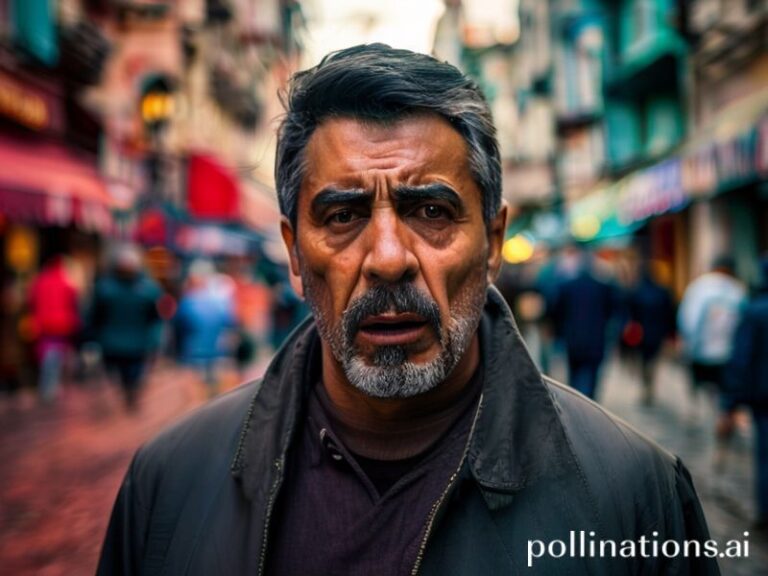Knives, Night Trains, and Viral Alibis: How One Ukrainian Girl’s Murder Became the Planet’s Latest Guilt Trip
A Knife on the Rails: How One Ukrainian Girl’s Murder Became the World’s Latest Morality Play
KYIV–PRAGUE–NEW DELHI, 24 May — If you want a snapshot of our collective attention span in 2024, picture this: somewhere between compartment 7 and the dining car, a 16-year-old Ukrainian girl named Darya Kovalenko was fatally stabbed on the overnight express from Kyiv to Warsaw. By the time the train squeaked to an emergency stop in the Polish border town of Chelm, three strangers had already livestreamed the bloodied corridor, two influencers had posted “thoughts & prayers” selfies in adjacent carriages, and Elon Musk had tweeted a Ukrainian flag emoji—then deleted it. Efficiency, it seems, is the only thing humanity hasn’t off-shored.
The suspect, a 29-year-old Serbian national traveling on a French residence permit, reportedly muttered something about “cosmic justice” before plunging a four-inch blade into Darya’s chest. Cosmic or not, justice now faces the bureaucratic labyrinth of three jurisdictions, four languages, and one EU arrest warrant that still requires a fax to Belgrade. Welcome to Schengen: where borders are frictionless for tourists and murderers alike, but paperwork remains eternal.
INTERNATIONAL FALL-OUT, OR THE ABSENCE THEREOF
Within hours, every capital issued the obligatory condemnation. Kyiv blamed “Russian hybrid warfare” (because apparently nothing happens in Ukraine anymore without a Kremlin weather machine). Warsaw promised “swift justice,” a phrase that in Polish politics roughly translates to “see you at the next election cycle.” Berlin offered trauma counsellors; Brussels offered funding for “rail-safe” AI scanners—because if there’s one thing Europe loves more than moral outrage, it’s a procurement contract with a 200-page tender dossier.
Meanwhile, on Telegram, Indian nationalists blamed Pakistani sleeper cells, Pakistani nationalists blamed “Western moral decay,” and American podcasters blamed TikTok. Somewhere in Lagos a scammer repurposed Darya’s photo for a fake GoFundMe titled “Help Orphan Train Survivor.” The campaign reached $12,000 before Facebook noticed the orphan in question was alive and currently arguing in the comments section. Collective grief, like everything else, has supply chains.
THE GLOBAL LESSON NO ONE WILL LEARN
International media ran the obligatory 24-hour cycle: teary classmates, candlelit vigils, a solemn Ukrainian folk song remixed by a German DJ within 48 hours. Then came the pivot to “What this means for your summer rail plans,” followed by a skincare ad. If tragedy plus time equals comedy, tragedy plus Wi-Fi equals forgetfulness.
Yet the incident is a neat parable for our era. A post-Soviet teenager boards a European train fleeing a war her generation didn’t start, only to be killed by a Balkan man with French paperwork and cosmic delusions—while the world watches through smartphone glass. The weapon was local; the context global. The motive may have been madness, but the stage was pure globalization: cheap tickets, open borders, virality on demand.
DARK HUMOR AS COPING MECHANISM, OR BUSINESS MODEL
Rail operators across Europe responded by trialing AI surveillance—cameras that can detect “aggressive gestures” at 200 frames per second, presumably trained on footage of Black Friday in Walmart. Civil libertarians objected, influencers unboxed the new GoPro 13 “Stab-Cam,” and somewhere a venture capitalist pitched “Uber for armed escorts.” Because if you can’t stop the knife, you might as well monetize the fear.
CONCLUSION: A MOMENT OF SILENCE, SPONSORED BY AUDIBLE
Darya’s mother asked for privacy. The internet complied for exactly nine minutes. By now the train has been scrubbed, renumbered, and sent back into service—Ukraine’s war economy can’t afford idle rolling stock. And somewhere tonight, another teenager will board another night train, earbuds in, algorithmic playlist queued, trusting the rails and the strangers and the fragile fiction that we are all in this together.
We aren’t, of course. But it’s impolite to say so out loud. Instead we retweet, we light virtual candles, we update our travel insurance. And in the quiet between carriages, the world keeps moving—fast enough to outrun guilt, slow enough for the next tragedy to hop aboard.







